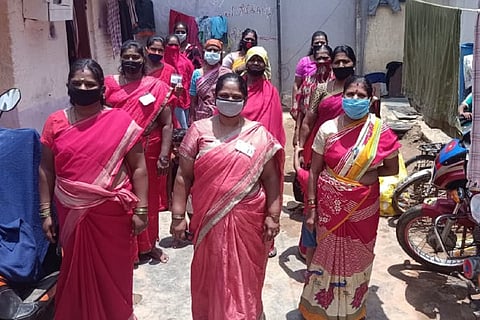

Kent, a healthcare products company known for manufacturing RO (reverse osmosis) water purifiers, has faced severe backlash for its advertisement selling a dough and bread maker. The advertisement, published on Instagram, was severely criticised on social media for its classist take. “Are you allowing your maid to knead atta dough by hand? Her hands may be infected” the ad reads. Many slammed the advertisement and some even called for a boycott of Kent's products.
For domestic workers in Bengaluru, the discriminatory portrayal, however, is all too real. They have been at the receiving end of such prejudice ever since the outbreak of coronavirus.
Geeta Menon, founder of Stree Jagruthi Samiti, who also helped form the Domestic Workers Rights Union Karnataka, says that a recent survey conducted by her organisation showed that 80% of domestic workers in the city have been asked to not come to work for the next two months (June and July). Many employers were of the opinion that domestic workers are carriers of the virus, as per the survey.
“Just like the Kent advertisement, many are stigmatising domestic workers. The ad only points out the mentality of the privileged. If people are scared, there is a way of communicating it but treating domestic workers like the source of infection is wrong. Over 80% of domestic workers have been told not to come to work for the next two months because their employers fear that they are carriers of the virus. Shutting themselves inside a room when the domestic worker comes to work, all this is insensitive and stigmatising,” Geeta Menon says.
Sharadamma is a 57-year-old resident of Suddaguntepalya in Bengaluru. She has been a domestic worker for the last 30 years. With the lockdown in place, her employers paid her the salary for the month of March. However, starting April, none of her employers have paid her. When she decided to go back to work at various homes in GM Palya, Sharadamma was asked to stay at home and not come near their houses.
“Everyone thinks that we live in dirty houses and don't maintain hygiene. Some of my employers said that since I am old, they are scared of me spreading it to them. Last week, they all told me not to come to work for two months as they are scared that I will spread the virus. Now, I don't know what to do for two months. They are not even willing to pay,” she says.
Similarly, Pushpalata Ramesh, a 37-year-old domestic worker in Hennur, says that associations of apartments where she worked prior to the lockdown have banned her from entering the building altogether. Pushpalata works at five homes in two different apartment complexes in Hennur.
“In one of the apartment complexes where I work at two houses, my employers were initially paying me. Now the association is stopping me from entering, saying that I go to many people's houses and it is not safe for me to move around. My employers also got scared and they said that I can't come to work for two more months. They said they have not yet decided whether to pay me or not. We help clean their houses and this is how they treat us?” Pushpalata questions.
With finding new employment at this time a near impossibility, domestic workers say they have been settling for lesser pay to stay afloat.
Prema, a 30-year-old domestic worker in Banaswadi, says that her employers fired her last week, stating apprehensions about her spreading the infection. This is also because Prema lives with her husband and a few other daily wage workers in hutments in Banaswadi.
“My employer said that the place where I live is not hygienic and that they are scared of getting infected. Now I found a job at a bachelor's house. They are going to pay me Rs 1,500 per month. Earlier, I used to earn twice as much and my starting salary was Rs 3,500 per house. I don't know what else I can do,” she adds.
Geeta Menon, who has been documenting grievances of domestic workers across the city, says that 50% of the domestic workers in Bengaluru have not received their pay for the month of April while many have been laid off by employers.
“This is not all. Many RWAs (Residents Welfare Associations) are not allowing domestic workers to use lifts. Many women have to climb several flights of stairs. As soon as the domestic worker enters the house, people have been shutting themselves in rooms. Again, taking precautions is right but the way it is done also matters. There can be a better way of handling this,” she points out.